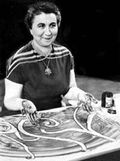 Like other “graduates” of Ding Dong School, just thinking about the show and its motherly host, Miss Frances, gives me a warm and safe feeling. Airing nationally from 1952 to 1956 and in syndication until 1965, Ding Dong School set the standard for TV shows aimed at preschoolers and was a clear influence on Mr. Rogers and other shows that followed in its footsteps.
Like other “graduates” of Ding Dong School, just thinking about the show and its motherly host, Miss Frances, gives me a warm and safe feeling. Airing nationally from 1952 to 1956 and in syndication until 1965, Ding Dong School set the standard for TV shows aimed at preschoolers and was a clear influence on Mr. Rogers and other shows that followed in its footsteps.
The show was simplicity itself. Its only host/character/performer was Dr. Frances Rappaport Horwich (“Miss Frances”), head of the education department at Chicago’s Roosevelt College. With her ease in front of the camera and lack of self-consciousness, Dr. Horwich was a natural on TV. She talked directly to the camera, addressing the home viewers as if they were there in the room with her, even asking questions and waiting for the response. I know that I felt that she was talking directly to me. She had a wonderfully calm, gentle, yet lively way of speaking, and just exuded maternal warmth and caring. Like Mr. Rogers after her, she didn’t talk down to her young viewers but always addressed them with respect and dignity.
Like any good preschool, the show presented a mix of education and play. Miss Frances talked about some of the new experiences and challenges that preschoolers would be facing, like going to the dentist, and told them what to expect. She showed them how to play games or do various arts and crafts activities.
One of the most wonderful things about Ding Dong School came at the end of the show, when Miss Frances asked her young viewers to go get whichever adult was at home with them and bring them to the TV (of course most moms did not work outside the home in those days). Miss Frances would then tell the children to go and play, so that she could talk privately to Mom. Miss Frances would tell Mom about what she and the children had talked about and done during the show, so that Mom would be prepared for any follow-up questions her child might have or requests to play the games or do the activities that were covered during that day’s show. But she would also talk more broadly to parents about preschoolers’ educational, social, and developmental needs and interests, and give them suggestions and pointers about how to address these needs. So Ding Dong School was designed as an educational show for parents as much as kids.
Though Miss Frances didn’t seem to mind selling Kix on the air, she later quit her job as head of children’s programming at NBC over her discomfort with the increasing commercialism and decreasing educational focus of children’s TV.
Seeing videos of the show today, one has to marvel at its slow and gentle pace. Would today’s toddlers sit through three minutes of Miss Frances blowing bubbles with a bubble pipe? I sure hope they would.
You can read more about Ding Dong School in The Golden Age of Chicago Children’s Television.

Recent Comments